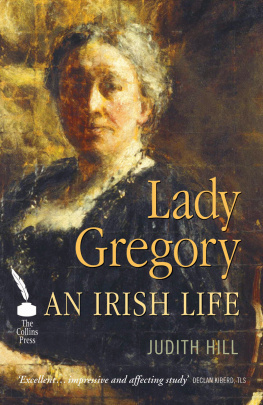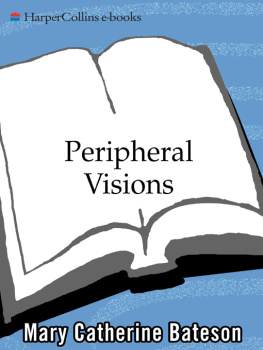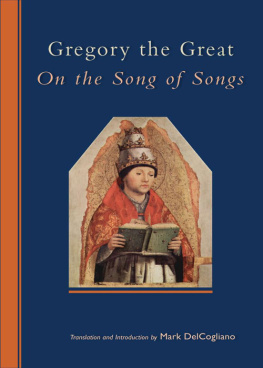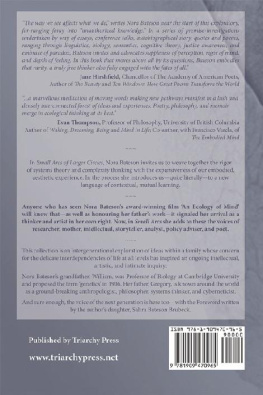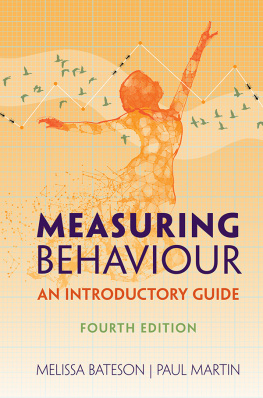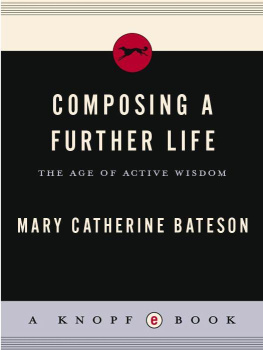Runaway
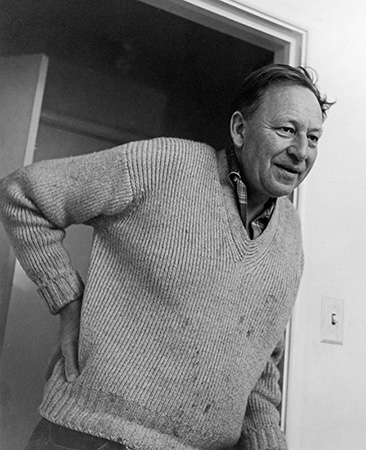
1958 portrait of Bateson by Imogen Cunningham
This book was published with the assistance of the Anniversary Fund of the University of North Carolina Press.
2017 Anthony Chaney
All rights reserved
Manufactured in the United States of America
The University of North Carolina Press has been a member of the Green Press Initiative since 2003.
FRONTISPIECE Gregory Bateson in 1958. Portrait by Imogen Cunningham. 1958, 2016 Imogen Cunningham Trust.
JACKET ILLUSTRATION Photos by Barry Schwartz Photography.
LIBRARY OF CONGRESS CATALOGING-IN-PUBLICATION DATA
Names: Chaney, Anthony, author.
Title: Runaway : Gregory Bateson, the double bind, and the rise of ecological consciousness / Anthony Chaney.
Description: Chapel Hill : University of North Carolina Press, [2017] | Includes bibliographical references and index.
Identifiers: LCCN 2016053761 | ISBN 9781469631738 (cloth : alk. paper) | ISBN 9781469631745 (ebook)
Subjects: LCSH: Bateson, Gregory, 19041980. | AnthropologistsUnited StatesBiography. | Human ecologyHistory20th century. | Human ecologyPhilosophy. | Nineteen sixties. | Postmodernism.
Classification: LCC GN21.B383 C53 2017 | DDC 301.092 [B]dc23
LC record available at https://lccn.loc.gov/2016053761
To ANDREA
with love and gratitude
and to our children
CLEO and COLE
Contents
Figures
Gregory Bateson at his observation window
Margaret Mead and Gregory Bateson at work in the field
The double-bind research group, circa 1956
Frieda Fromm-Reichmann
Lois and Gregory Bateson
Gregory Bateson and spinner dolphins
John C. Lilly, Marineland, Florida, 1958
Konrad Lorenz with gosling imprinted to surrogate mother
W. B. Bateson, 1924
Young Gregory Bateson
Scene from the 1966 stage production of Marat/Sade
R. D. Laing, 1967
Emmett Grogan, Artist Liberation Front Meeting, 1967
Scenes from the Congress on the Dialectics of Liberation, July 1967
Allen Ginsberg at the Congress on the Dialectics of Liberation, 1967
Gregory Bateson and his underwater listening device
Runaway
Introduction: Gregory Bateson and the Spirit of 1967
In a 1986 interview, the poet Allen Ginsberg was asked to look back on the year 1967. That was the year of psychedelia, the year of the Human Be-In, where San Franciscos counterculture came out to the American mainstream. It was the year the Beatles Sgt. Peppers Lonely Hearts Club Band was released, initiating a season that some called Vietnam Summer and others the Summer of Love. What was the true impact of that fabled year, Ginsberg was asked, and what remained of its spirit?
Ginsbergs answer may be unexpected. Civilization was conscious now that the planet as an ecological unity was in danger, he said. Beyond changes in style and music, in sex and politics, beyond the drugs and liberation, the most significant and permanent change had to do with humankinds relationship with the earth. Remember, Ginsberg said, the notion of Armageddon apocalypse before the Sixties was considered eccentric, whereas now its a universal awareness.
Ginsberg spent a good deal of the summer of 1967 not in San Francisco but in Italy and England. In July he attended a two-week-long London event called the Congress on the Dialectics of Liberation. Organized by the anti-psychiatrist R. D. Laing and his colleagues, this forum brought together radical writers, artists, social scientists, and political theorists, including Herbert Marcuse of the Frankfort School; Paul Goodman, the author of Growing Up Absurd; and civil rights activist Stokely Carmichael, who had spent the previous year stirring up audiences on the topic of Black Power. These voices mixed Karl Marx and Sigmund Freud, Gestalt psychology, Frantz Fanon and decolonization, and existentialist philosophy. They set one down in the mire, as the novelist Saul Bellow had complained a few
The events many programs drew crowds large and small. A number of the participants were members of what seemed a rising nation of discontented, insurgent youth, and the crowd was laced with this movements self-styled leadership. Ginsberg himself had appeared at the old railroad roundhouse where the congress was held, on a panel with Laing, Carmichael, and Emmett Grogan, founder of a San Francisco cadre of artist-anarchists called the Diggers. Yet almost two decades after this event, as Ginsberg elaborated on his answer about the legacy of 1967 and the Summer of Love, he did not mention Laing, Carmichael, or Grogan. He didnt mention Timothy Leary, Che Guevara, or any of the other cultural-political icons of that year. Instead, he spoke of Gregory Bateson.
Gregory Bateson (190480) was what might be called today an outlier. He was a generation older than Ginsberg. He was, and remains, relatively unknown. Bateson had never held an institutional post of any distinction. Yet he came from an illustrious family with roots deep in the British legacy of the life sciences. His father was the biologist William Bateson, who had pioneered the field of genetics. Gregory trained in the new field of anthropology and was part of a group of engineers, mathematicians, and social scientists who initiated concepts in systems and information theory in the Macy Conferences on Cybernetics. He had been married to Margaret Mead. In the 1950s, after his divorce from Mead, Bateson studied communication in a psychiatric clinic in Palo Alto and introduced the double-bind theory of schizophrenia. In 1967 he was sixty-three years old and was living in a sleepy Hawaiian beach town, studying dolphins. Not unlike Ginsberg, there was something of the rebel in him, demonstrated by his willingness as a scientist to move from discipline to discipline in a career where to specialize was to thrive.
Bateson had spoken at the London congress, too. Ginsberg had met and heard him. Very tall, with longish gray hair pushed back from a domed forehead, Bateson was informal and even careless in his posture and dress but rigorous in his thinking and talk. To the audience in London, he spoke of something called the greenhouse effect. Humankinds large-scale burning of fossil fuels threatened a change in the earths climate, a melting of the polar ice caps, and a rising of sea levels worldwide. The greenhouse effect, together with a number of other threats to the environment, was evidence of an ecology undergoing what the systems engineers of the Macy Conferences called
Ginsbergs glib remark belies how much the exposure to Bateson haunted him. It was a revelation, he recalled in the 1986 interview, that if man did not destroy the earth by an atomic bomb in one flash, he might achieve the same end by a slow poisoning of the atmosphere. In his poem Howl, Ginsberg had reckoned with the emotional toll resulting from the threat of instantaneous atomic annihilation and the Cold War culture of containment at home and abroad. Now he confronted another kind of toll, another kind of apocalypse.
Ginsbergs experience in London was an instance of what Richard Falk called the apocalyptic encounter, the stark confrontation with the unsustainability of modern ways of being and of perceiving, an encounter Falk described as the essence of the postmodern. This book takes Falks and Ginsbergs claims seriously: that a shift in thinking about humankind and the environment is the underrecognized legacy of the 1960s and the foremost intellectual experience of our time.
Although the brainchild of R. D. Laing and his colleagues, the Congress on the Dialectics of Liberation took on a life of its own, driven by the concerns of a surging protest movement. Debate was most heated over how best to meet foreign and domestic imperialist oppression, by the expansion of consciousness or by militant resistance. Amid familiar calls for political liberation, Bateson raised the less familiar prospect of ecological limitation.
Next page

